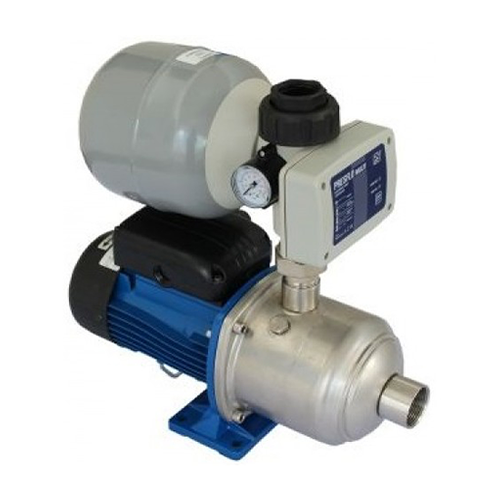In an era characterized by rapid technological advancements, the traditional approaches to water management are being challenged and transformed.
At the forefront of this revolution is the emergence of smart pumps, which integrate cutting-edge technologies to enhance efficiency, reduce energy consumption, and optimize water usage across various applications.
This article delves into the role of smart pumps in revolutionizing water management, highlighting their functionalities, benefits, and potential future developments.
Understanding Smart Pumps
Smart pumps are advanced pumping systems equipped with sensors, control systems, and connectivity features that allow for real-time monitoring and data analysis.
Unlike conventional pumps, which operate on fixed schedules and settings, smart pumps leverage the Internet of Things (IoT) and data analytics to adapt their operations dynamically based on environmental conditions and user demands.
Key features of smart pumps include:
- Real-Time Monitoring: Smart pumps continuously monitor parameters such as flow rate, pressure, temperature, and energy consumption. This data is transmitted to a central management system, enabling operators to track performance in real-time.
- Automated Control: Through advanced algorithms and machine learning, smart pumps can automatically adjust their operations based on real-time data. This means they can respond to changes in demand or system conditions without human intervention.
- Remote Access and Control: Many smart pumps can be accessed remotely via smartphones or computers. This feature allows operators to manage and monitor systems from anywhere, improving response times to issues and reducing the need for on-site inspections.
Benefits of Smart Pumps in Water Management
The integration of smart pumps into water management systems offers a multitude of benefits that can address some of the most pressing challenges in the sector.
- Enhanced Efficiency and Energy Savings
Smart pumps optimize energy consumption by adjusting their operation to meet real-time demand. By running at variable speeds and only when needed, these pumps can reduce energy costs significantly. For instance, in municipal water systems, smart pumps can lower energy usage by 30% to 50%, translating to substantial cost savings for utilities.
- Improved Water Quality and Reliability
By monitoring parameters such as pressure and flow rates, smart pumps help maintain optimal water quality. They can detect anomalies that may indicate contamination or system failures, enabling prompt responses to mitigate risks. This proactive approach enhances the reliability of water supply systems, ensuring that communities receive safe and consistent water.
- Predictive Maintenance
Smart pumps employ predictive analytics to foresee potential failures before they occur. By analyzing historical data and operational patterns, these systems can alert operators to maintenance needs, reducing downtime and repair costs. This shift from reactive to proactive maintenance is particularly beneficial in reducing the lifecycle costs of pumping systems.
- Sustainable Water Usage
With increasing pressure on freshwater resources, sustainable management practices are essential. Smart pumps enable precise control over water distribution, minimizing waste and promoting conservation. In agricultural applications, for example, farmers can optimize irrigation schedules based on real-time soil moisture data, reducing water usage while maximizing crop yield.
- Data-Driven Decision Making
The data collected by smart pumps provides valuable insights for water management authorities. By analyzing trends and performance metrics, decision-makers can identify inefficiencies, forecast demand, and make informed investments in infrastructure. This data-driven approach leads to more strategic planning and resource allocation.
Case Studies in Smart Pump Implementation
- Municipal Water Supply
In several cities across the globe, smart pumps have been integrated into municipal water supply systems. For instance, a city in the United States implemented smart pumps that monitor water flow and pressure in real-time. This led to a 25% reduction in energy costs and improved response times to leaks, enhancing overall system reliability.
- Agricultural Irrigation
Farmers in regions with scarce water resources are leveraging smart pumps to optimize irrigation practices. By integrating soil moisture sensors with smart pumping systems, farmers can ensure that crops receive the right amount of water at the right time. This approach has led to a 40% reduction in water usage while maintaining or even increasing crop yields.
- Industrial Applications
Industries that rely heavily on water, such as food processing and manufacturing, are also adopting smart pumps. One beverage manufacturer reported a 30% reduction in water consumption after implementing smart pumping solutions that allowed for better monitoring and control of water usage throughout the production process.
Future Developments in Smart Pump Technology
As technology continues to evolve, the potential for smart pumps to further revolutionize water management is immense. Future developments may include:
- Artificial Intelligence Integration: The incorporation of AI could enhance the predictive capabilities of smart pumps, allowing for even more sophisticated decision-making and automation.
- Enhanced Connectivity: With the expansion of 5G technology, smart pumps will benefit from faster data transmission and improved connectivity, enabling more comprehensive and real-time monitoring.
- Sustainability Initiatives: The demand for sustainable practices will drive innovation in smart pump design, leading to the development of more energy-efficient models and systems that prioritize eco-friendly materials.
Conclusion
Smart pumps represent a significant advancement in water management, offering numerous benefits that address the challenges of efficiency, sustainability, and reliability. As industries and municipalities continue to embrace these technologies, the potential for revolutionizing water management is vast.
By leveraging real-time data and automated controls, smart pumps are not just transforming how we manage water; they are paving the way for a more sustainable and efficient future.
In a world where water scarcity is becoming increasingly prevalent, the adoption of smart pump technology is not just a trend but a necessity for ensuring a sustainable water supply for generations to come.
Also Read
Pumping up efficiency:The latest innovations in pump technology
From groundwater to grout: The versatile applications of pumps in construction

